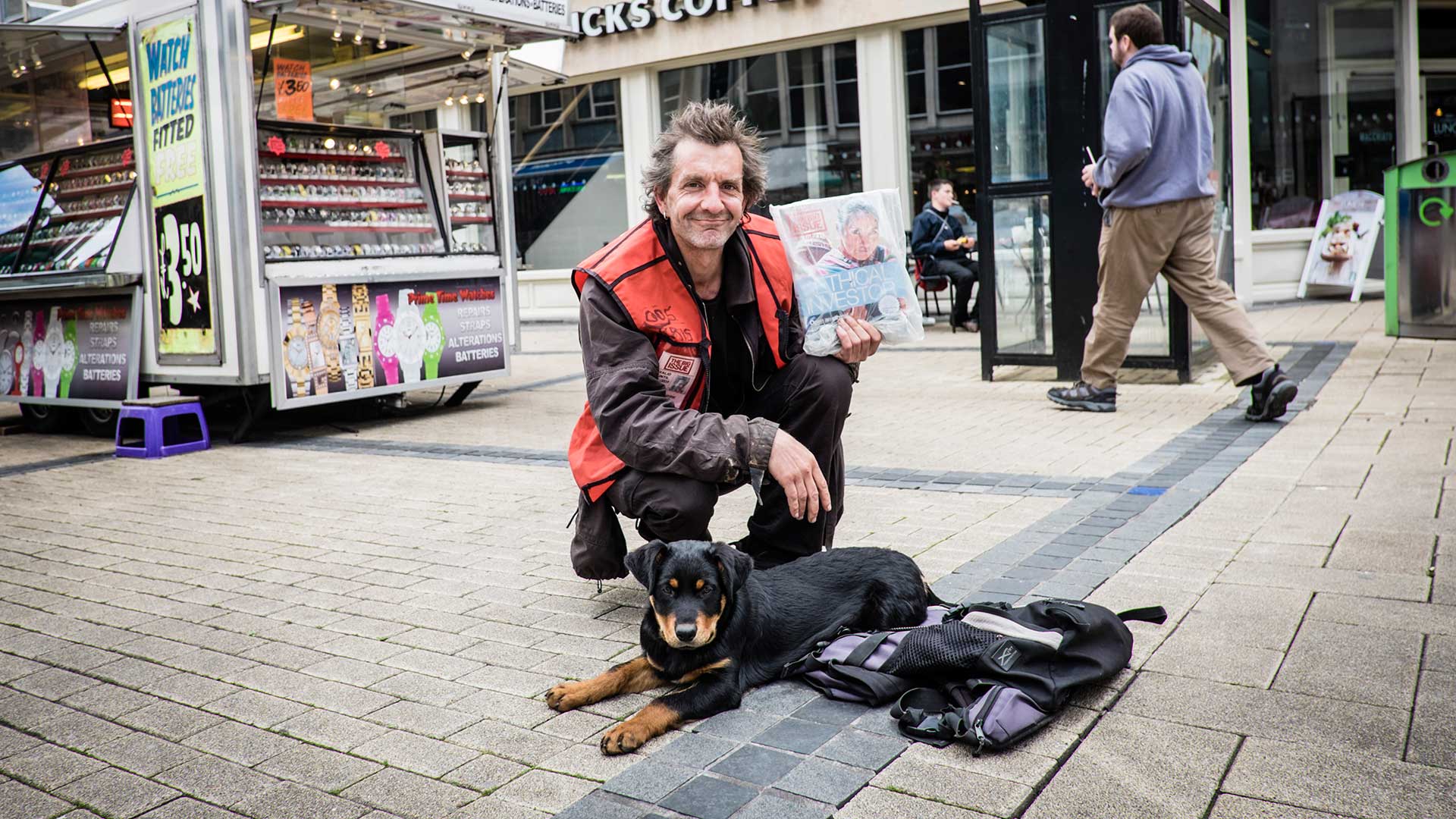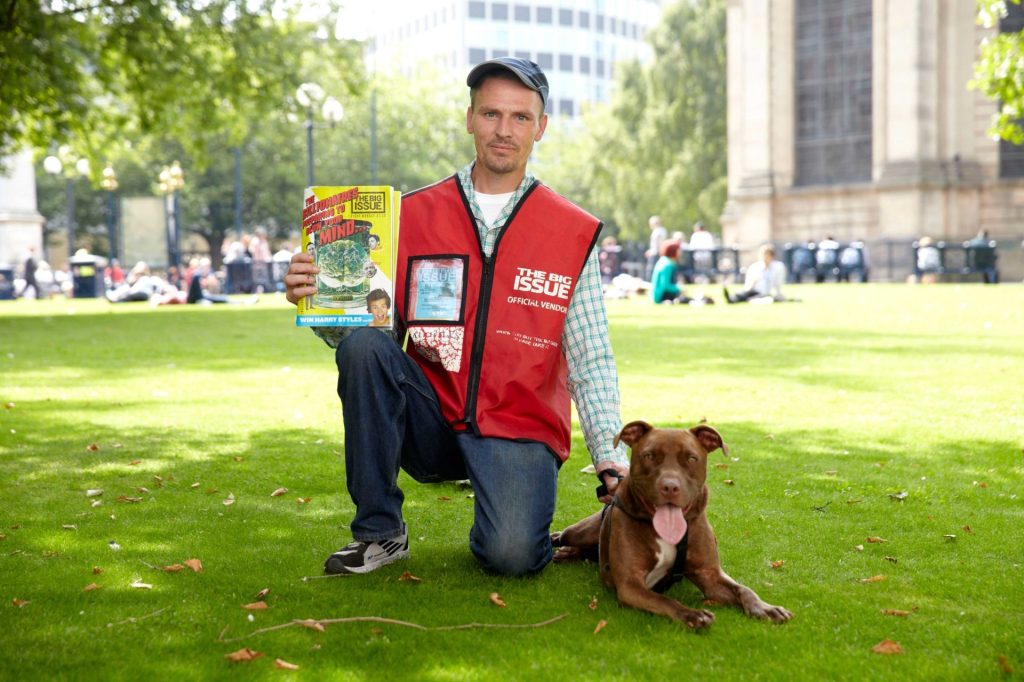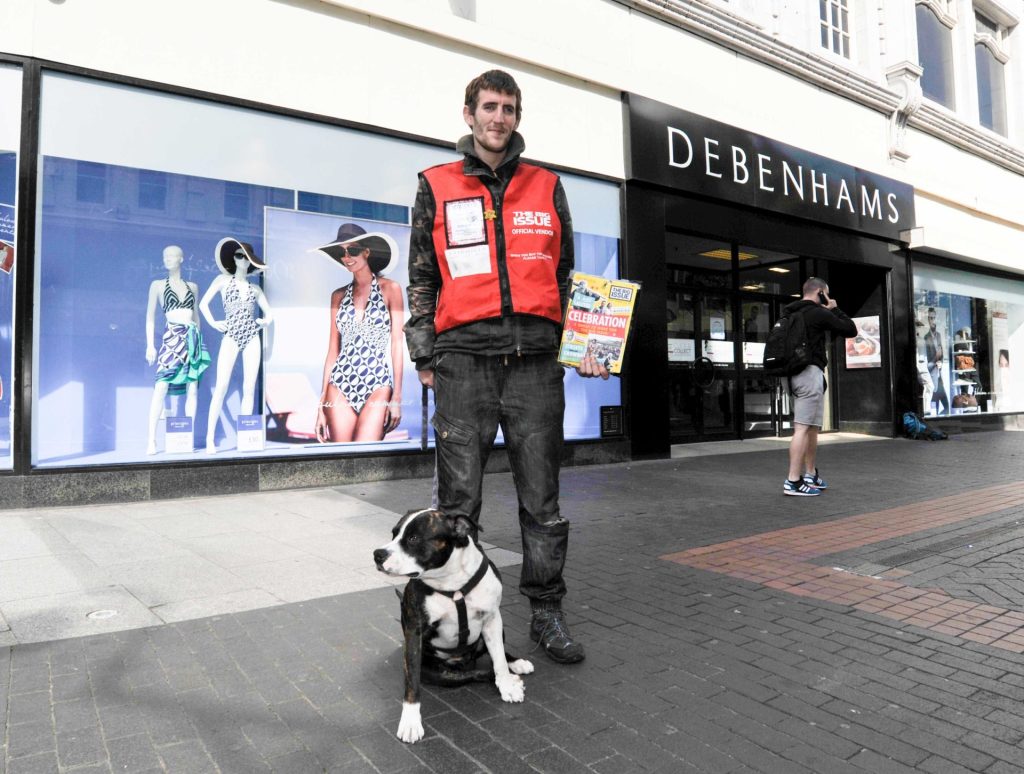“It can be difficult having more than one mouth to feed, of course, but it’s always worth it. I wouldn’t change it for the world. He eats before I eat. He’s my boy, he comes first.”
For many homeless men and women, a dog can become a friend who offers companionship – something they might not have experienced in a broken life often littered with abandonment and uncertainty. Discovering a caring and trusting attachment can be instrumental in helping rebuild someone’s life. For the dog itself, that human bond is crucial in a life that could otherwise be spent in an isolated shelter.
“I had just become homeless when I took care of Koala,” explains former Bristol vendor Hugo Elliot (main picture). “Things had fallen apart for me, I didn’t have a penny. I was at the stage where prison seemed my best option.
“I had nowhere to go and then all of a sudden, after a friend couldn’t take the puppy as planned, I said I’d look after it. I’d owned a few dogs before, I know what joy they can bring to your life and I thought I could help this dog.
“She’s so sweet-natured and gentle, really the perfect company. Now she’s enjoying a good life in a warm home and will grow up to be a happy dog.”
Oxford vendor Steve Trigg’s alcoholism was out of control until his collie-cross Charlie had puppies. He knew he had to kick the booze to become a better owner.
Advertising helps fund Big Issue’s mission to end poverty
“My dog turned my life around. I would probably be dead by now if it wasn’t for Charlie,” says Steve, who says he used to drink seven litres of sherry a day. “We spend every minute together. I never thought a dog could have such a powerful influence on my life.”
“For many people experiencing homelessness a pet can be a vital companion,” explains Stephen Robertson, chief executive of The Big Issue Foundation, which offers Big Issue vendors support and advice in caring for their pets.
I never thought a dog could have such a powerful influence on my life
“Taking responsibility for another being can be a critical moment in someone’s journey away from the immediacy and desperation of your situation. Pets can also help reach out to other people; the shared appreciation of another creature helps bridge a gap and connects people where perhaps otherwise they might not.”
However, for an individual on the street, owning a dog can also act as a barrier to finding shelter. Carrie Spurgeon helps run Hearthounds, a charity in Leeds that supports people who have found themselves living on the streets with their dogs.
“To these men and women, their dogs are often their only family and their only friend,” she explains. “They help keep them warm and protect them and they are absolutely devoted to each other.
“Many of them have been brought up in care from a young age, often with a lot of abuse, and they’ve found themselves on the streets for various reasons. Very few night shelters allow dogs, and so they would rather sleep on the street or in a tent with their dog because they don’t want to give it up to the dog warden. They know they could lose it or worse, it could be put to sleep.”
Advertising helps fund Big Issue’s mission to end poverty
In fact, as little as eight per cent of hostels in the UK accept dogs. Increasing the number of dog-friendly hostels has been an ongoing battle for the Dogs Trust, which runs an initiative called The Hope Project across 103 towns and cities, providing free and subsidised veterinary treatment to any dog whose owner is homeless or in housing crisis.
“Given a choice between sleeping in a hostel or staying with their dog, most dog owners will stay with their dog on the street,” says Lynsey Alston, The Hope Project’s outreach development co-ordinator. The scheme works with 300 homelessness organisations, 130 veterinary practices and 20 Big Issue distribution offices nationwide. Last year alone it funded more than 1,800 treatments.
“The Hope Project gives them peace of mind,” Lynsey adds. They can come to us if their dog is unwell or hurt without worrying about how they’re going to pay for veterinary treatment, which of course is often difficult for a homeless person to afford.
“I find that dogs whose owners are homeless are generally very well looked after. The individual will put the needs of the dog before themselves.
It can be difficult having more than one mouth to feed, of course, but it’s always worth it
“The best thing about my job is being able to help the dog when it needs medication or an operation but it’s also about how much we’re helping the owner. It lifts their spirits to know that they’re getting help in taking care of their dog as they try to rebuild their lives.”
This notion rings especially true with Hugo, who has just started a construction job. He puts his huge stride forward from homelessness and contemplating prison, to finding a secure place to live and full-time work, down to the positive impact his dog had at a crucial point in his life.
Advertising helps fund Big Issue’s mission to end poverty
“Koala helped me turn my life around,” he says. “I mean it. I was on the way down and without her I’d probably have went completely off the rails. She changed my life.”












